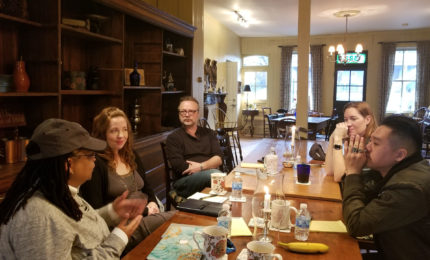How to Avoid Common Screenwriting Mistakes
By Grace Smith | November 2, 2023

It’s that time of year again! No, I’m not talking about the Holiday Season, I mean the submission period for the 10th Annual Missouri Stories Scriptwriting Competition! Every year we get dozens of wonderful scripts, but occasionally our judges see mistakes in scripts that can bring your score down. Most of these have nothing to do with the story and are easy to fix if you know what you are looking for. Below is a handy guide to make sure your script has the best chance of getting a better score!
- Proofread, Proofread, Proofread. Everybody makes mistakes. When you are writing a 100+ page feature, it is undoubtable that there will be at least a few typos. Proof reading is an important step that you do not want to skip. A misspelled word or bad grammar can take a reader right out of the story, and you don’t want a typo to distract from your stunning script! Proofread it yourself or ask a trusted friend or professional proofreader. Sometimes it helps to read it out loud to pick up little things.
- Use proper formatting. Script formatting seems like a silly thing to worry about, but it is really important when you get to the production stage. Generally, the rule is one page of a script equals one minute of screen time, but if a script is improperly formatted, it will throw that whole equation off. Proper formatting, like capitalizing a character’s name when they are introduced or labeling an insert makes it much easier for the judges to read and follow. Scriptwriting software like Final Draft does a lot of the formatting for you, but not everything. A great resource is the book The Hollywood Standard. It breaks down basically anything you would want to write in your script and shows you the proper way to format it.
- Use active language. Your action descriptions are just that, actions. You want to make sure your writing matches the pace of the story, so instead of saying something like “Mary starts walking to the table,” you can just say “Mary walks to the table.” A good rule is that you should avoid verbs ending in –ing and the verb is.
- Make sure your character names are different enough. If you have two characters named Mary and Maria, or Mark and Matt, considering changing one. When it’s on the screen, it’s easy to tell the difference, but on the page, it’s easy to get confused about which one you are talking about.
- Don’t use long paragraphs. Paragraphs in the action descriptions in general should not exceed three lines. A big block of text makes it easy to lose details, because it makes the reader more likely to skim. Each new action should get a new line. Instead of something like this:
“Bob walks to the desk. He hesitates for a moment, then makes the decision. He reaches out into the top drawer and pulls out a banana. He checks to see if it has brown spots, then tucks it into his pocket.”
Write something like this.
“Bob walks to the desk. He hesitates for a moment, then makes the decision.
He reaches out into the top drawer and pulls out
A BANANA.
He checks to see if it has brown spots, then tucks it into his pocket.”
- Make sure your main character is actually the protagonist. This seems obvious, but it is something that a lot of new writers (and some experienced ones) struggle with. You main character should be the one pushing the story forward. Their decisions should have a direct effect on the plot, and they are the person who should be making the decision in the climactic moment. There are a few exceptions to this rule, like Max in Mad Max: Fury Road, and Nick Carraway in The Great Gatsby, but this is because they serve as a point of view to show the real protagonist, or as a foil for them.
- Use authentic dialogue. When all of your characters talk in exactly the same voice, your voice, it makes them hard to distinguish them from each other and it makes them feel less real. Make sure there is variation in the way they talk, the vernacular they use, and their accents. Note, if a character has a distinct accent, you can show that in their syntax and note it in a parenthetical, but do not write the dialogue phonetically, as it makes it much more difficult to read and isn’t always the most authentic.
- Make sure your characters have wants and needs. A want is something the character is aware of, the thing they say they are pursuing. A need is a deeper, often unknown urge for something missing in their life. A great example of this is Barbie. In this movie, Barbie wants to get rid of her cellulite and have pointed feet again, but what she needs is to learn the truth about how women are treated in the world and reclaim her own story. The wants and needs are often at odds with each other, and that can make for great internal conflict.
- Show, don’t tell. This is one of the most important rules in screenwriting. Screenwriting is, at its core, a visual medium. So instead of saying something like “Anna is a hard worker,” which tells us a fact about her, you can instead write “Anna is the only one in the office. Her clock reads 6:37pm. There are enormous stacks of papers littering her desk, but she moves through them quickly and efficiently.” This tells us Anna is a hard worker, but it gives us so much more as well, and it is more interesting to read.
- Rewrite! You finally wrote THE END. But your writing isn’t over. It is an old adage the writing is rewriting, and that couldn’t be truer. The rewriting process is essential to make a really outstanding screenplay. So ask for notes, take the feedback, reread the script yourself, and rewrite as many times as it takes until you feel satisfied.
This just scratches the surface of everything you need to know about screenwriting, so if you are interested in learning more, a couple of great resources are the book “Prewriting Your Screenplay” by Michael Tabb and “Kill the Dog” by Paul Guyot. Both Michael and Paul are previous Missouri Stories mentors, so you can also get a little taste of what the fellowship is like! And after you have gone through your script and fixed the mistakes, make sure to submit it to the Missouri Stories Scriptwriting Fellowship!





